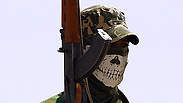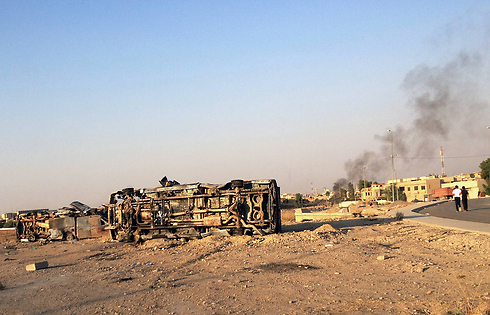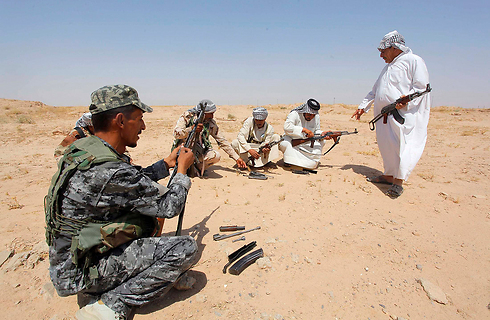
ISIS declares new Islamic caliphate
ISIS changes name to just Islamic State, says 'legality of all emirates, groups, states and organizations becomes null by the expansion of the caliph's authority.'
With brutal efficiency, the Sunni extremist group has carved out a large chunk of territory that has effectively erased the border between Iraq and Syria and laid the foundations of its proto-state. But the declaration, made on the first day of the Muslim holy month of Ramadan, could trigger a wave of infighting among the Sunni militant factions that formed a loose alliance in the blitz across Iraq and impact the broader international jihadist movement, especially the future of al-Qaeda.
The spokesman for the Islamic State of Iraq and the Levant (or ISIS) declared the group's chief, Abu Bakr al-Baghdadi, as the leader of the new caliphate, or Islamic state, and called on Muslims everywhere, not just those in areas under the organization's control, to swear loyalty to al-Baghdadi and support him.
"The legality of all emirates, groups, states and organizations becomes null by the expansion of the caliph's authority and the arrival of its troops to their areas," said the spokesman, Abu Mohammed al-Adnani, in an audio statement posted online. "Listen to your caliph and obey him. Support your state, which grows every day."
Al-Adnani loosely defined the Islamic state's territory as running from northern Syria to the Iraqi province of Diyala - a vast stretch of land straddling the border that is already largely under the Islamic State's control. He also said that with the establishment of the caliphate, the group was changing its name to just the Islamic State, dropping the mention of Iraq and the Levant.
Muslim extremists have long dreamed of recreating the Islamic state, or caliphate, that ruled over the Middle East, much of North Africa and beyond in various forms over the course of Islam's 1,400-year history.
It was unclear what immediate impact the declaration would have on the ground in Syria and Iraq, though experts predicted it could herald infighting among the Sunni militants who have joined forces with the Islamic State in its fight against Iraqi Prime Minister Nouri al-Maliki and his Shiite-led government.
"Now the insurgents in Iraq have no excuse for working with ISIS if they were hoping to share power with ISIS," said Aymenn al-Tamimi, an analyst who specializes in Islamic militants in Iraq and Syria, using one of several acronyms for the Islamic State. "The prospect of infighting in Iraq is increased for sure."
Terror under threat
The greatest impact, however, could be on the broader international jihadist movement, in particular on the future of al-Qaeda.
Founded by Osama bin Laden, the group that carried out the Sept. 11 attacks on the US has long carried the mantle of the international jihadi cause. But the Islamic State has managed to do in Syria and Iraq what al-Qaeda never has - carve out a large swath of territory in the heart of the Arab world and control it.
"This announcement poses a huge threat to al-Qaeda and its long-time position of leadership of the international jihadist cause," said Charles Lister, a visiting fellow at the Brookings Doha Center, in emailed comments. "Taken globally, the younger generation of the jihadist community is becoming more and more supportive of (the Islamic State), largely out of fealty to its slick and proven capacity for attaining rapid results through brutality."
Al-Baghdadi, an ambitious Iraqi militant who has a $10 million US bounty on his head, took the reins of the Islamic State in 2010 when it was still an al-Qaeda affiliate based in Iraq. Since then, he has transformed what had been an umbrella organization focused mainly on Iraq into a transnational military force.
Al-Baghdadi has long been at odds with al-Qaeda leader Ayman al-Zawahri, and the two had a very public falling out after al-Baghdadi ignored al-Zawahri's demands that the Islamic State leave Syria. Fed up with al-Baghdadi and unable to control him, al-Zawahri formally disavowed the Islamic State in February.
But al-Baghdadi's stature has only grown since then, as the Islamic State's fighters have strengthened their grip on much of Syria, and now overrun large swathes of Iraq.
In Washington, the Obama administration called on the international community to unite in the face of the threat posed by the Sunni extremists.
"ISIL's strategy to develop a caliphate across the region has been clear for some time now. That is why this is a critical moment for the international community to stand together against ISIL and the advances it has made," State Department spokeswoman Jen Psaki said.
The Islamic State's declaration comes as the Iraqi government tries to wrest back some of the territory it has lost to the jihadi group and its Sunni militant allies in recent weeks.
On Sunday, Iraqi helicopter gunships struck suspected insurgent positions for a second consecutive day in the northern city of Tikrit, the predominantly Sunni hometown of former dictator Saddam Hussein. The Iraqi military launched its push to wrest back Tikrit, a hotbed of antipathy toward Iraq's Shiite-led government, on Saturday with a multi-pronged assault spearheaded by ground troops backed by tanks and helicopters.
The insurgents appeared to have repelled the military's initial push for Tikrit, and remained in control of the city on Sunday, but clashes were taking place in the northern neighborhood of Qadissiyah, two residents reached by telephone said.
Muhanad Saif al-Din, who lives in the city center, said he could see smoke rising from Qadissiyah, which borders the University of Tikrit, where troops brought by helicopter established a bridgehead two days ago. He said many of the militants had deployed to the city's outskirts, apparently to blunt the Iraqi military attack.
Military spokesman Qassim al-Moussawi told reporters Sunday that government troops in full control of the university and had raised the Iraqi flag over the campus.
"The battle has several stages. The security forces have cleared most of the areas of the first stage and we have achieved results," al-Moussawi said. "It is a matter of time before we declare the total clearing" of Tikrit.
A provincial official reached by telephone reported clashes northwest of the city around an air base that previously served as a US military facility known as Camp Speicher. He spoke on condition of anonymity because he was not authorized to brief the media.
Jawad al-Bolani, a security official in the provincial operation command, said the US was sharing intelligence with Iraq and has played an "essential" role in the Tikrit offensive.
"The Americans are with us and they are an important part in the success we are achieving in and around Tikrit," al-Bolani told The Associated Press.
Washington has sent 180 of 300 American troops President Barack Obama has promised to help Iraqi forces. The US is also flying manned and unmanned aircraft on reconnaissance missions over Iraq.
Iraq's government is eager to make progress in Tikrit after weeks of demoralizing defeats at the hands of the Islamic State and its Sunni allies. The militants' surge across the vast Sunni-dominated areas that stretch from Baghdad north and west to the Syrian and Jordanian borders has thrown Iraq into its deepest crisis since US troops withdrew in December 2011.
More ominously, the insurgent blitz, which prompted Kurdish forces to assert long-held claims over disputed territory, has raised the prospect of Iraq being split in three, along sectarian and ethnic lines.
For the embattled al-Maliki, success in Tikrit could help restore a degree of faith in his ability to stem the militant tide. Al-Maliki, a Shiite who has been widely accused of monopolizing power and alienating Iraq's Sunni and Kurdish minorities, is under growing pressure to step aside. But he appears set on a third consecutive term as prime minister after his bloc won the most seats in April elections.












